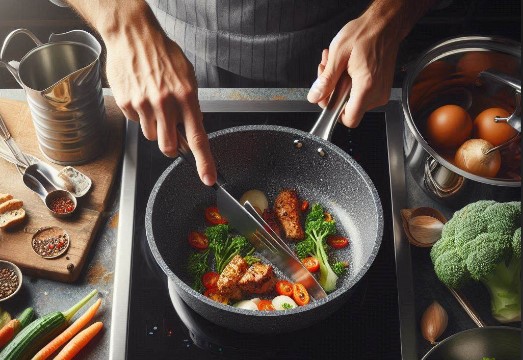Granite cookware generally offers a non-stick surface and is more visually appealing, while stainless steel cookware provides superior durability, heat conductivity, and versatility.
Granite cookware is known for its attractive appearance and non-stick properties, which make it easier to cook with less oil and clean up afterward. Its non-reactive surface ensures that it doesn’t alter the taste of food. However, granite cookware is less durable than stainless steel and may chip or crack over time.
Stainless steel cookware, on the other hand, is highly durable and resistant to rust, stains, and scratches. It heats evenly and can withstand high temperatures, making it suitable for various cooking techniques. Stainless steel cookware often includes an aluminum or copper core to enhance heat conductivity.
| Feature | Granite Cookware | Stainless Steel Cookware |
|---|---|---|
| Durability | Less durable; prone to chipping | Highly durable; resistant to rust |
| Heat Conductivity | Poor; may cause uneven heating | Excellent; even heating |
| Non-Stick Properties | High; easy to clean | None; requires oil or cooking spray |
| Appearance | Attractive and available in various colors | Classic and neutral |
| Compatibility | Limited to certain cooktops | Compatible with all cooktops, including induction |
| Maintenance | Requires gentle cleaning to avoid damage | Easy to maintain; dishwasher safe |

Granite Cookware
What is Granite Cookware?
Granite cookware is often made from aluminum or steel coated with granite stone. This coating provides a non-stick surface that is both visually appealing and practical. The granite layer is typically reinforced with a ceramic coating, enhancing its durability and resistance to scratches.
Advantages of Granite Cookware
- Non-Stick Surface: The granite coating provides an excellent non-stick surface, making cooking easy with less oil and ensuring that food releases effortlessly.
- Aesthetics: Granite cookware often features a sleek, modern look with its speckled surface, which can add a touch of elegance to your kitchen.
- Even Heat Distribution: Granite cookware’s aluminum or steel base ensures even heat distribution, reducing hot spots and promoting consistent cooking results.
Disadvantages of Granite Cookware
- Durability: While granite cookware is scratch-resistant, it can be prone to chipping if mishandled. The granite coating may wear off over time, especially with frequent use.
- Price: Granite cookware can be more expensive than some other types, particularly if it features a high-quality granite coating.
- Compatibility: Granite cookware may not be suitable for induction cooktops, as the material is not magnetic.
| Feature | Granite Cookware |
|---|---|
| Non-Stick Surface | Yes |
| Heat Distribution | Even |
| Aesthetics | Sleek and Modern |
| Durability | Moderate |
| Price Range | Higher |
| Induction Compatible | No |
Stainless Steel Cookware

Credit: www.nytimes.com
What is Stainless Steel Cookware?
Stainless steel cookware is made from iron, chromium, and nickel. The addition of chromium makes the cookware resistant to rust and staining, while nickel enhances its durability and appearance. Stainless steel cookware often features an aluminum or copper core to improve heat conductivity.
Advantages of Stainless Steel Cookware
- Durability: Stainless steel is incredibly durable and resistant to scratches, dents, and rust. It can withstand high temperatures and is frequently used without losing appearance or performance.
- Versatility: Stainless steel cookware is compatible with all cooktops, including induction. It can be used in the oven, under the broiler, and on various stovetop surfaces.
- Ease of Maintenance: Stainless steel cookware is easy to clean and maintain. Unlike some non-stick surfaces, it is dishwasher safe and does not require special utensils.
Disadvantages of Stainless Steel Cookware
- Heat Conductivity: While high-quality stainless steel cookware often has an aluminum or copper core to improve heat conductivity, it can still have uneven heat distribution compared to other materials.
- Price: High-quality stainless steel cookware can be pricey, particularly if it includes features like multiple layers or a thick core.
- Food Sticking: Food may stick to the surface without a non-stick coating, requiring more oil or fat for cooking and making cleaning slightly more challenging.
| Feature | Stainless Steel Cookware |
|---|---|
| Non-Stick Surface | No |
| Heat Distribution | Good (with core) |
| Aesthetics | Sleek and Modern |
| Durability | High |
| Price Range | Moderate to High |
| Induction Compatible | Yes |
Comparing Granite and Stainless Steel Cookware
Performance in Cooking
Granite cookware excels at providing a non-stick surface, making it ideal for low-fat cooking and easy cleanup. However, it may not offer the same level of durability and heat conductivity as stainless steel cookware. Stainless steel cookware, with its ability to withstand high temperatures and distribute heat evenly (especially with a core), is better suited for various cooking techniques, including browning and searing.
Durability and Longevity
Stainless steel is renowned for its durability and longevity. It can handle rough use and high temperatures without showing signs of wear. Granite cookware, while durable, can suffer from chipping and coating wear over time. For a long-lasting investment, stainless steel may be the better choice.
Maintenance and Cleaning
Both types of cookware have their maintenance requirements. Granite cookware is easy to clean due to its non-stick surface but may need careful handling to prevent damage. Stainless steel cookware, while easy to clean and dishwasher safe, may require more effort to prevent food from sticking and maintain its shine.
Cost Considerations
Granite cookware often has a higher price tag, especially with a high-quality granite coating. Stainless steel cookware can also be expensive, particularly for high-end brands or those with multiple layers. However, the long-term durability of stainless steel may offer better value for money over time.
| Aspect | Granite Cookware | Stainless Steel Cookware |
|---|---|---|
| Cooking Performance | Excellent non-stick | Even heat distribution |
| Durability | Moderate | High |
| Maintenance | Easy but careful | Easy, may require extra effort |
| Cost | Higher | Moderate to High |
What are the key differences between granite and stainless steel cookware?
Granite cookware features a non-stick surface, often made from a layer of enamel or coating over a metal base. This surface is known for its easy cleanup and ability to cook food with less oil. On the other hand, stainless steel cookware is made from an alloy of iron, chromium, and other metals, giving it a durable, non-reactive surface. Stainless steel does not have a non-stick coating but is known for its longevity and resistance to corrosion.
Which type of cookware is more durable: granite or stainless steel?
Stainless steel cookware is generally more durable than granite cookware. Stainless steel is resistant to scratches, dents, and staining, making it a long-lasting option for daily use. Granite cookware, while durable in its own right, can chip or scratch more easily, particularly if metal utensils are used. Over time, the non-stick coating on granite cookware may wear off, affecting its performance.
How does each type of cookware perform in terms of heat conductivity?
Stainless steel cookware often has an aluminum or copper core to enhance its heat conductivity, leading to even cooking. Pure stainless steel can be less efficient at conducting heat compared to materials like aluminum or copper. On the other hand, granite cookware typically has a base made from aluminum, which allows for good heat distribution. However, the non-stick surface can affect how heat is transferred.
Is granite or stainless steel cookware easier to clean?
Granite cookware is generally easier to clean due to its non-stick surface. Food residues are less likely to stick, making cleanup simpler. Stainless steel cookware, while not non-stick, can still be cleaned effectively and properly. However, more scrubbing may be required to remove stuck-on food or stains. The dishwasher can clean both types, but always check the manufacturer’s recommendations.
Which cookware is better for health and safety?
Stainless steel cookware is often considered a safer choice because it has no coatings that might wear off or leach into food. It is free from potentially harmful chemicals. Depending on its quality, granite cookware can also be safe, but lower-quality non-stick coatings might release harmful substances if damaged or overheated. Always opt for high-quality granite cookware to minimize health risks.
How do the costs of granite and stainless steel cookware compare?
Granite cookware generally has a lower price point than high-quality stainless steel cookware. However, this can vary depending on brand and construction. High-end stainless steel cookware can be quite expensive but often has better durability and a longer lifespan. In the long run, investing in stainless steel may be more economical due to its durability.
Which cookware is better for high-heat cooking?
Stainless steel cookware is better suited for high-heat cooking. It can handle high temperatures without warping or damaging the surface. Granite cookware is more limited in this regard, as excessive heat can damage the non-stick coating. For tasks like searing or browning, stainless steel is generally preferred.
Are there any specific maintenance tips for each type of cookware?
Avoid using abrasive cleaners or steel wool for stainless steel, as these can scratch the surface. Use gentle scrubbers and non-abrasive cleaners for best results. For granite cookware, avoid using metal utensils to prevent scratching the non-stick surface. Regularly check for any signs of wear and follow the manufacturer’s care instructions to maintain the cookware’s performance.
Final Decision
Choosing between granite and stainless steel cookware depends on your cooking style, preferences, and budget. Granite cookware offers a stylish, non-stick option with good heat distribution but may lack in durability. Stainless steel cookware provides exceptional durability, compatibility with all cooktops, and versatility, making it a robust choice for various cooking needs. Consider your priorities regarding performance, maintenance, and cost to make the best decision for your kitchen.

I may be a little “crazy” when it comes to cooking, but I enjoy every minute of it. Spending time in the kitchen itself, whether with my family or my friends, brings me both happiness and exhilaration. This blog was created to showcase my cooking/eating with family and friends. And also as an opportunity to discuss ideas on food and the culinary circle in general.
Pingback: Can I use a copper scrubber on stainless steel? (Video Explained) – Kitchen World